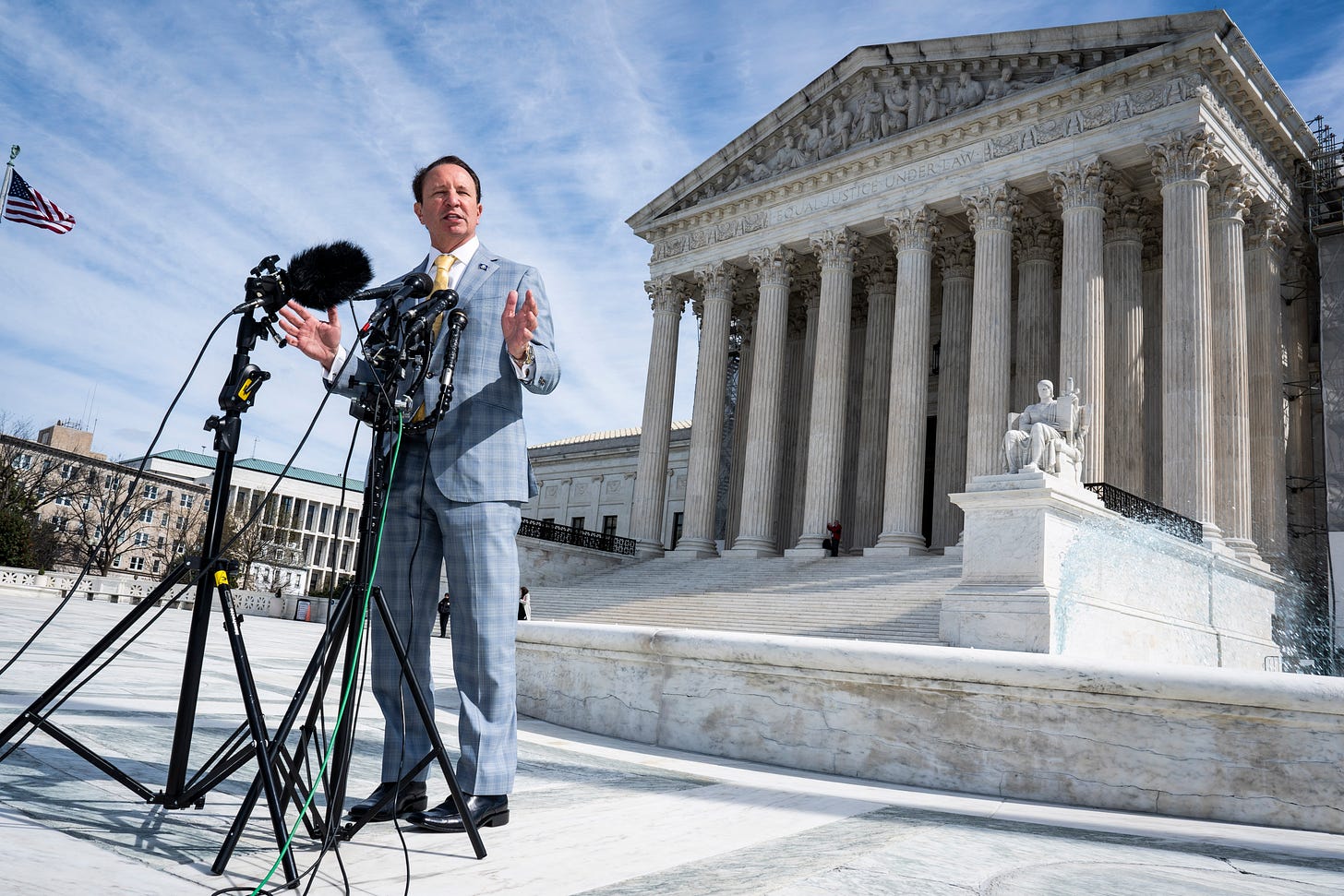Louisiana Republicans write a guide for Alito and Thomas
Their Ten Commandments law has a small but powerful audience.
PN is a reader-supported publication made possible by paid subscribers. Appreciate our independent journalism? Then please sign up to support us.
On its own, Louisiana’s new law requiring the Ten Commandments to be displayed in every public school classroom is bad enough, a victory for evangelicals who want to push their narrow, conservative view of Christianity on everyone else.
But even worse, the law is designed to spark a lawsuit that will make its way up to the US Supreme Court. It’s part of a coordinated effort by the right to use a Court stuffed with right-wing Christians to reverse decades of precedent.
First, the law itself. In a laughably obvious attempt to mask its central focus — to force Christianity into the public schools — Louisiana’s law states that it “provide[s] for the display of the Mayflower Compact, the Declaration of Independence, the Northwest Ordinance, and the Ten Commandments.” Unsurprisingly, only the Ten Commandments are required to be displayed. The remainder are mere suggestions.
These aren’t randomly chosen historical documents. Rather, they’re included as a little history lesson about the treatment of religion at the time of the nation's founding. That’s a transparent bid for the attention of some of the most conservative jurists — most notably Justices Samuel Alito and Clarence Thomas — who are in thrall to the idea that the nation should never advance past the late 1700s and should treat the Constitution as if it is entombed in amber.
Both Justice Alito’s decision in Dobbs v. Jackson, which overturned the constitutional right to abortion, and Justice Thomas’s decision in New York State Rifle & Pistol Association Inc. v. Bruen, which made it nearly impossible to enact any gun control measures, relied upon this sort of faux-historical nonsense. The conservative justices have styled themselves as historians despite actual historians pointing out that their cherry-picking efforts are wildly flawed.
But the merits have long been beside the point. That’s why Louisiana Republicans passed a law that, much like the 15-week abortion ban in Dobbs, is designed to be challenged as unconstitutional. It’s the surest way to give the conservatives on the Court a chance to completely erase the line between church and state.
The lessons of Dobbs
To get there, the Supreme Court would need to overturn Stone v. Graham, a 1980 case about a near-identical Kentucky law requiring the Ten Commandments be displayed in public schools. The Court wrote that the “preeminent purpose for posting the Ten Commandments on schoolroom walls is plainly religious in nature” and that the Commandments “do not confine themselves to arguably secular matters.”
The Court also held that Kentucky couldn’t get around the unconstitutionality by requiring that copies of the Ten Commandments be financed by private contributions — also a feature of the Louisiana law. Simply posting the copies “under the auspices of the legislature” showed the official support of the state.
A note from Aaron: Working with brilliant contributors like Lisa requires resources. To support this work and make it sustainable, please click the button below and become a paid subscriber.
Conservatives in Kentucky tried roughly the same thing 20 years later, with two counties posting copies of the Ten Commandments in their courthouses. In 2005’s McCreary County v. ACLU of Kentucky, the Supreme Court ruled against the counties, holding that the Ten Commandments were “an unmistakably religious statement dealing with religious obligations and with morality subject to religious sanction.”
Both cases make clear that Louisiana’s law is unconstitutional under current Supreme Court precedent. Republicans in Louisiana are fully aware of this, with Gov. Jeff Landry even saying, “I can’t wait to be sued.”
In drafting the law, Louisiana legislators showed they absorbed the lessons of Dobbs and Bruen. Both the Mayflower Compact and the Northwest Ordinance are included because of their religious language and when they were written. Louisiana’s law calls the Mayflower Compact, from 1620, “America’s first written constitution” and “a Covenant with Almighty God.” Calling the Mayflower Compact “America’s first written constitution” when it predates the founding of the nation by nearly 150 years is bad enough. Worse still is that the Compact was not in any way a democratically-ratified document. Instead, it was written and signed by 41 male passengers on the Mayflower as it landed in America.
The Northwest Ordinance is in the Louisiana law for the same reason — to extract religious language from the time of the Founders to prove that America is a Christian nation. Louisiana’s law notes that the Northwest Ordinance, from 1787, provided a method of admitting new states to the Union and stated that “(r)eligion, morality, and knowledge, being necessary to good government and the happiness of mankind, schools and the means of education shall forever be encouraged."
When historians write about the Northwest Ordinance, they focus on how it provided an organizational scheme for new territories, solidified the federal government's power, and prohibited slavery. But when, for example, the Federalist Society writes about the Northwest Ordinance, they focus on its religious language and, helpfully for conservative legislators, note that it’s a favorite of both Alito and Thomas as support for the notion that the government is required to entangle itself with Protestant Christianity, the First Amendment be damned.
Louisiana’s law goes on to discuss how the Ten Commandments appeared in public school textbooks as far back as 1688 and continued to appear in popular textbooks throughout the 1800s. It’s another blatant attempt to appeal to both Alito and Thomas, giving them a way to declare that having the Ten Commandments in public schools is “rooted in our Nation’s history and tradition.”
Eviscerating the separation of church and state
Conservative Supreme Court justices have been whittling away at the separation between church and state with increasing fervor over the last few years.
In 2020’s Espinoza v. Montana Department of Revenue, the Court held that if a state subsidizes private education, it cannot exclude religious schools. Two years later, in Carson v. Makin, the Court went even further, saying that when a state funds private schools in some fashion, they must also fund private religious schools, even if those schools will use the money for religious worship and instruction. That same year, in Kennedy v. Bremerton, the Court held it was not a violation of the First Amendment for a football coach at a public high school to lead students in an overtly Christian prayer at the 50-yard line.
If all of this sounds a lot like using taxpayer dollars to support religion, a thing that every American schoolchild learns is forbidden, that’s because it’s exactly that.
Louisiana isn’t the only state hoping to bend the Constitution until it breaks. Last year, Oklahoma’s Virtual Charter School Board approved a charter school that the Catholic Archdiocese of Oklahoma City will run, set to open this fall. The Archdiocese stated that it would operate the publicly-funded charter school as a religious school and “a genuine instrument of the Church.” There are already multiple legal challenges, with even Oklahoma’s conservative GOP attorney general, Gentner Drummond, asking the state Supreme Court to block the school from opening, saying it “eviscerates the separation of church and state.” Oklahoma’s highest court is expected to rule shortly, as $2.5 million in taxpayer dollars is set to start flowing to the school on July 1.
Religious conservatives in Louisiana and Oklahoma have paid close attention to the willingness of the right-wing justices to erode the line between church and state. Louisiana even gave the justices the history to use. We’re headed into a future that completely departs from a core tenet of American democracy — that the state cannot subsidize religion generally nor impose one specific religion on everyone.
It’s the same bleak future found in Dobbs and Bruen, one where divining the intent of long-dead founders will somehow always lead to results favored by conservatives. It’s a haphazard, disingenuous way to examine history, but it’s a great way to make bad laws.
That’s it for today
We’ll be back with more Wednesday. If you appreciate this free post, please support Public Notice by signing up. Paid subscribers make this work possible.
Thanks for reading.







White, straight, "Christian" males want a country ruled by their distorted view of religion because it will also keep in place the hierarchy of their dominance. It really isn't about religion. Like all abuse, it's about control.
Sorry, I don’t get it. The “originalist” view of the Constitution is the first sentence of the first amendment: “Congress shall make no law respecting an establishment of religion…”. How is making a case to Alito and Thomas about originalism when that sentence IS the original one?